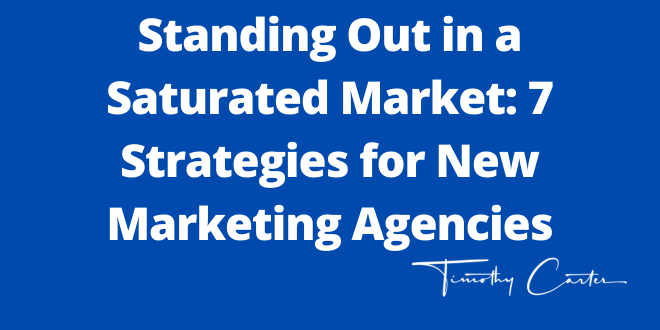
Embracing Change: Igniting Your Mind’s Potential
March 24, 2024
Maximizing Your Potential: Assessing Your Progress
March 25, 2024In today’s dynamic and fiercely competitive landscape, establishing a new marketing agency amidst a sea of competitors can seem like a daunting task. However, by employing a strategic approach and leveraging specific tactics, emerging agencies can effectively carve out their niche and distinguish themselves in the market.
We’ll explore seven key strategies and a question to consider that new marketing agencies can utilize to differentiate themselves in a saturated market.
Specialization: Focusing on a specific niche or industry can help the agency stand out. By becoming experts in a particular area, such as healthcare, technology, or sustainability, agencies can attract clients seeking specialized knowledge and tailored solutions.
Question: What specific industry or niche aligns best with your agency’s strengths and interests, and how can you leverage this specialization to meet the unique needs of clients within that sector?
Unique Value Proposition (UVP): Clearly articulating what sets the agency apart from competitors is essential. Whether it’s offering innovative services, delivering exceptional customer experience, or guaranteeing measurable results, a compelling UVP can attract attention and differentiate the agency in the market.
Question: What aspects of your agency’s offering truly set it apart, and how can you craft a UVP that resonates with your target audience’s pain points or desires?
Branding and Storytelling: Developing a strong brand identity and telling a compelling story can resonate with target audiences. Emphasizing the agency’s mission, values, and personality through branding elements, content marketing, and social media can help create an emotional connection with clients and prospects.
Question: How can you use storytelling to convey the journey, values, and mission of your agency in a way that resonates with your target audience?
Thought Leadership: Establishing credibility and authority in the industry through thought leadership initiatives can build trust and attract attention. Publishing insightful articles, hosting webinars, speaking at industry events, and participating in relevant forums or discussions can showcase the agency’s expertise and thought leadership.
Question: What knowledge or expertise can your agency share with the industry, and what platforms or channels are most effective for disseminating this thought leadership content?
Collaborations and Partnerships: Collaborating with complementary businesses or industry influencers can extend the agency’s reach and credibility. Partnering with technology providers, industry associations, or influential individuals can provide access to new networks and opportunities for collaboration and growth.
Question: Which potential partners share your agency’s values and goals, and how can you create mutually beneficial collaborations that elevate both parties?
Client-Centric Approach: Putting clients’ needs and goals at the forefront of everything the agency does can set it apart from competitors. Providing personalized solutions, exceptional customer service, and ongoing support can foster long-term relationships and generate positive word-of-mouth referrals.
Question: How can your agency consistently demonstrate its commitment to putting clients first, and what processes can be implemented to ensure every client interaction is tailored and meaningful?
Innovative Services or Technologies: Offering innovative services, leveraging cutting-edge technologies, or adopting new methodologies can differentiate the agency and attract clients looking for forward-thinking solutions. Staying abreast of industry trends and investing in continuous innovation can keep the agency ahead of the curve.
Question: What steps can your agency take to foster a culture of innovation, and how can you ensure that your services remain relevant and impactful in a rapidly evolving market landscape?
By implementing these strategies thoughtfully and consistently, new marketing agencies can effectively distinguish themselves in a saturated market and position themselves for long-term success.
Frequently Asked Questions
1. How can I measure the success of differentiation strategies in a saturated market?
Measuring success involves tracking key performance indicators (KPIs) such as client acquisition rates, retention rates, revenue growth, and brand recognition. Utilize analytics tools to monitor website traffic, social media engagement, and conversion rates. Solicit feedback from clients and conduct market research for valuable insights.
2. What challenges might new agencies face when implementing these strategies, and how can they overcome them?
Challenges may include establishing credibility, attracting clients, and effectively communicating unique value propositions amidst competition. Focus on building relationships with early clients, investing in thought leadership, and refining messaging and branding to resonate with target audiences.
3. Can you provide examples of successful differentiation strategies in action?
One example is a marketing agency specializing in sustainable practices. By integrating eco-friendly principles into their operations and marketing strategies, such as using recycled materials for promotional materials or offering carbon-neutral services, they differentiate themselves as an environmentally conscious choice for clients.
Another example is a healthcare-focused agency that establishes credibility through thought leadership, hosting webinars on emerging healthcare trends and publishing insightful articles on industry-specific challenges. These real-life examples showcase how differentiation strategies can be tailored to specific niches to attract clients and stand out in a competitive market.
4. How can I ensure alignment between my specialization and market demand?
Conduct market research, surveys, and competitor analysis to identify underserved or emerging market segments within your chosen niche. Stay informed about industry trends, technological advancements, and consumer preferences to adapt your specialization accordingly.
5. How can I adapt these strategies to evolving consumer preferences and industry trends over time?
Continuously monitor market dynamics, consumer behavior, and competitive landscape. Remain agile and responsive to changing conditions. Refine strategies, innovate service offerings, and pivot as needed to stay ahead of the curve and meet evolving client needs.




